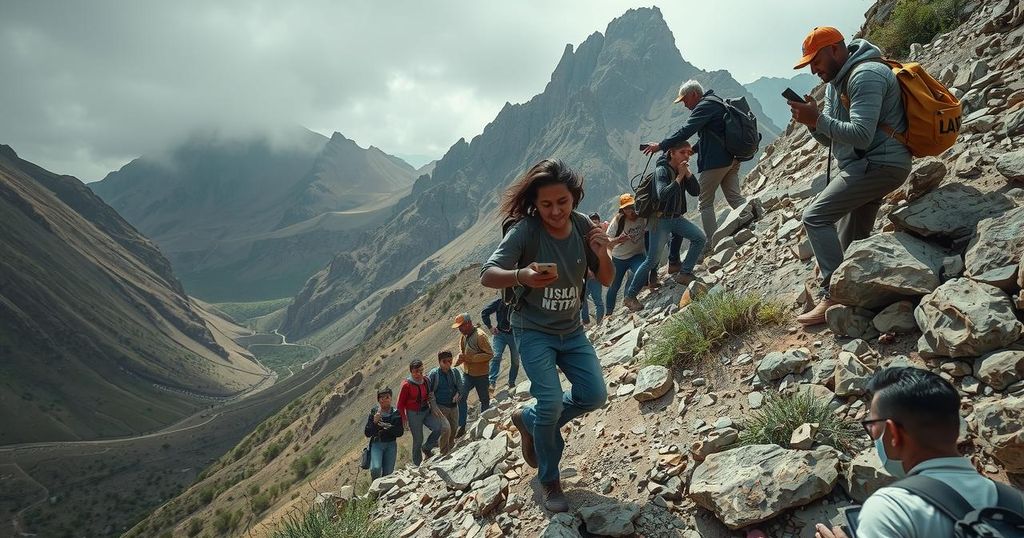World news
AFRICA, ASIA, CAIRO, CEASEFIRE, CHAD, CIVIL WAR, COMMITTEE TO PROTECT, CONFLICT, DARFUR, EGYPT, EL - GENEINA, GAZA, GAZA STRIP, GEDAREF, HUMANITARIAN CRISIS, IBRAHIM, NOON, NORTH DARFUR, RAPID SUPPORT FORCES, REPORTERS WITHOUT BORDERS, RSF, SUDAN, TAWILA, TO PROTECT JOURNALISTS, UN, UNION, WAR, WEST DARFUR
Stella Nguyen
0 Comments
Sudan’s Journalists: Risks of Reporting Amidst War and Violence
Sudanese journalists face extreme dangers in reporting on the ongoing war, including communications blackouts and violence, with at least 28 killed since April 2023. Despite detainment and torture, journalists like Noon and Ibrahim persist in their work to document human rights violations in Darfur. They emphasize the necessity of telling these stories amidst the risks they face, revealing the vital role of journalism in conflict.
In the midst of Sudan’s ongoing conflict, journalists face severe risks to report on the situation. Many have resorted to climbing mountains to find a signal from neighboring Chad, as the war has resulted in a communications blackout. Notable horrors from the conflict include sexual violence, ethnic massacres, and mass displacement in Darfur, according to journalists on the ground who strive to share these truths with the world.
Since the escalation of hostilities between the Sudanese army and the Rapid Support Forces (RSF) in April 2023, the toll on journalists has been devastating, with at least 28 reported deaths, as documented by Sudan’s journalist union. Numerous journalists have been detained, tortured, or displaced, often cut off from essential resources such as electricity and internet access.
Among those affected is a freelance journalist, referred to as Noon, who fled El-Geneina after reporting on mass killings attributed to the RSF and its alliances. As the situation intensified, her family’s home was raided multiple times by armed groups seeking her reporting equipment. Following her relocation to Gedaref, she was arrested by the army and coerced into signing a pledge to seek permission for every story, highlighting the dangers faced by journalists.
Another journalist, Ibrahim, is currently undercover in North Darfur, reporting on humanitarian crises amidst violence and starvation. His situation is precarious; having previously been detained and tortured by RSF fighters, he now relies solely on his mobile phone to continue documenting stories while keeping his identity secret to avoid arrest.
The hostile environment for journalists in Sudan has only worsened since the onset of the war. Veteran reporters have been forced to adopt alternative means of survival, such as farming, while still attempting to send news reports when they can find a signal. Youssef, a journalist engaged in subsistence farming, has experienced significant adversity, including kidnappings and detainment by armed groups.
Despite the lack of support from media organizations, both Youssef and Ibrahim persist in their efforts to report on the situation. Ibrahim transformed a local coffee shop into an informal newsroom, emphasizing the critical nature of their work: “Who else will tell the world what’s happening in Darfur if we leave?” Their commitment to journalism under dire circumstances underscores the essential role of the press in documenting human rights violations and humanitarian crises.
In summary, journalists in Sudan are exhibiting remarkable courage as they navigate perilous conditions to report on the ongoing war and its aftermath. Despite the extreme dangers involving detainment, torture, and displacement, these individuals are dedicated to revealing the atrocities occurring in Darfur. Their endeavors highlight the critical importance of a free press in times of conflict and emphasize the need for support and protection for those who continue to risk their lives for the truth.
Original Source: www.france24.com




Post Comment